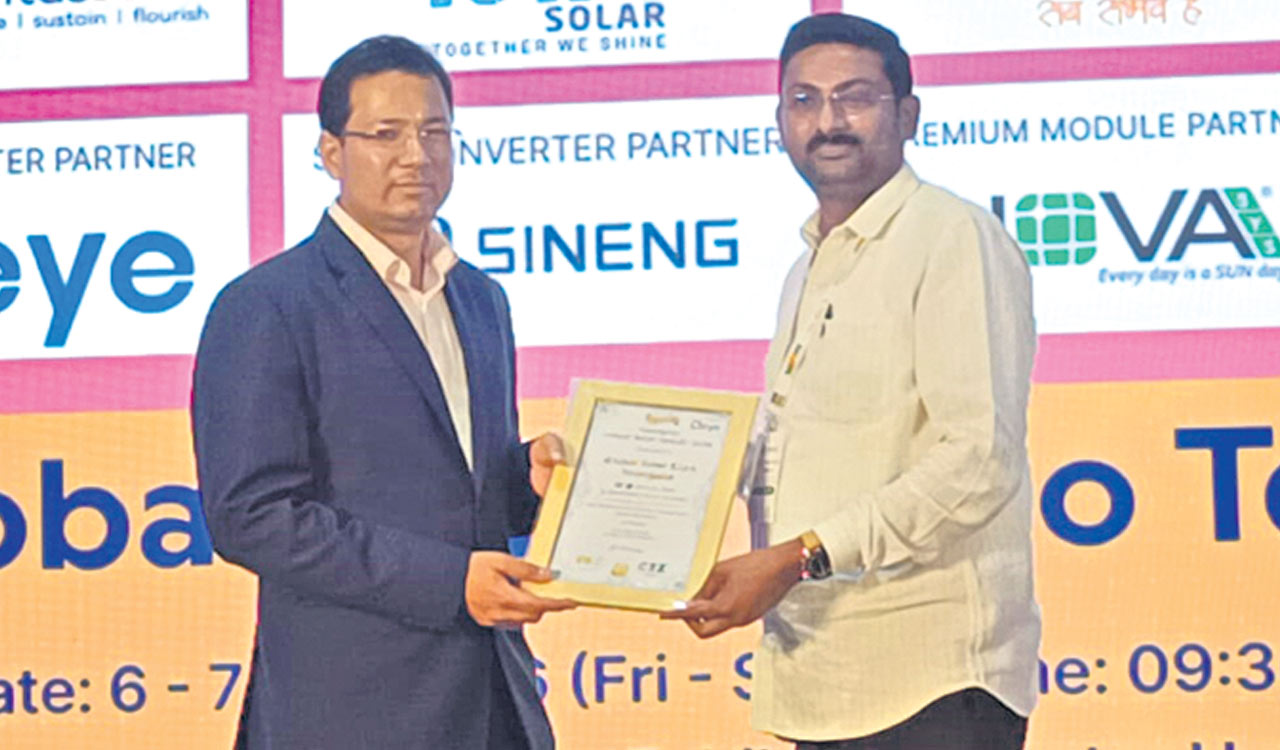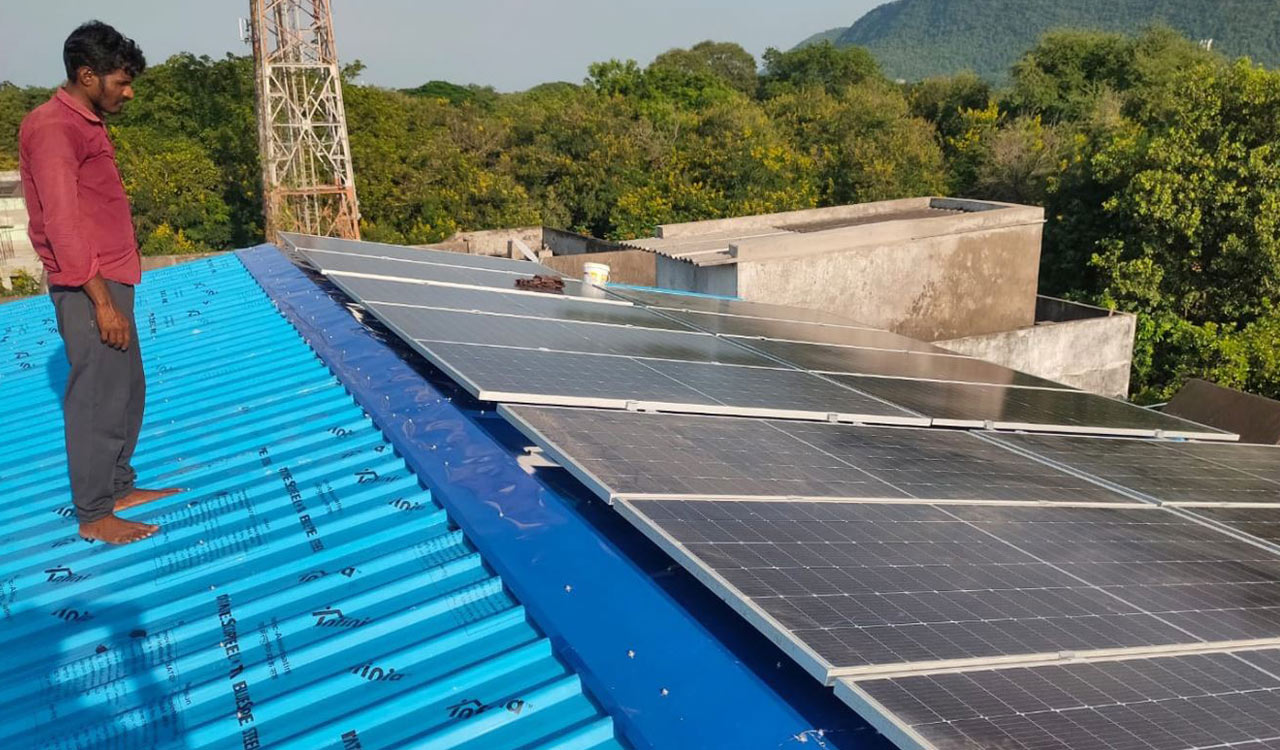Centre’s diktat to opt for domestic solar panel discourages consumers
The DCR policy mandates that specific projects, especially those associated with subsidies and the CPSU (Central Public Sector Undertakings) scheme, use solar panels that are domestically manufactured, leaving the consumers left with no choice but to purchase solar panels at higher rates from the empaneled companies

Hyderabad: The Centre’s dikhat to opt for solar panels as per the Domestic Content Requirement (DCR) norms was making installing rooftop solar panels at residential homes less attractive and forcing people to drop their plans to shift to solar due to high cost of domestic made solar panels.
The DCR policy mandates that specific projects, especially those associated with subsidies and the CPSU (Central Public Sector Undertakings) scheme, use solar panels that are domestically manufactured, leaving the consumers left with no choice but to purchase solar panels at higher rates from the empaneled companies.
The current norms laid down by the Ministry of New and Renewable Energy (MNRE) for availing subsidy will be of no use for consumers, who are planning to install advanced solar panels like Mono-PERC(Passivated Emitter & Rear Cell), on their residence.
The government has fixed a cap of Rs.78,000 for all the consumers installing solar panels upto 3 KW and above and since the cost of domestically manufactured Mono-PERC panels are much higher, the subsidy offered by the government would not be of much help, especially those who are looking to install panels between 3 to 5 KW.
In fact, if a consumer opts for domestic Mono-PERC, he would end up paying more than the imported and superior quality panels available in the market.
The domestically manufactured Mono-PERC solar panel would reportedly cost 20 to 40 percent more than the imported one making it very difficult for an average consumer to install them on his residence.
If the Centre does not make changes in its subsidy norms, most of the consumers opting for Mono-PERC panels would have to forgo the subsidy and purchase panels from the open market, affecting the spirit of the initiative.
In the Indian solar market, Mono PERC panels have gained importance due to their superior efficiency and performance, but due to their high cost and the government not providing sufficient subsidy, people are forced to pay more.
A large number of people have reportedly dropped their plan to install Mono PERC panels in the State due to high cost. “By forcing consumers to source from domestic suppliers, the government was putting additional burden on them.
This will discourage people from turning to solar energy, ” says Telangana Solar Energy Association President B Ashok Kumar Goud.
The centre should either increase the subsidy or provide incentives to the manufacturers so that the cost of panels, especially the high end Mono-PERC panels, could be brought down, Ashok Kumar suggested.
“Since non-DCR solar panels too are being manufactured domestically, the centre should allow the consumers to purchase the non-DCR panels at subsidized rates, “he said.
The Ministry of New and Renewable Energy (MNRE) introduced this policy to promote local manufacturing and support the “Make in India” initiative, however, experts feel that the DCR was increasing the cost of renewable energy equipment, leading to an increase in the cost of renewable energy itself.
The “PM Surya Ghar Muft Bijli Yojana” scheme envisages subsidizing rooftop solar installations for nearly one crore households in the country involving an estimated subsidy of Rs.75,000 crore. However, only domestic manufacturers, certified as part of the Approved Models and Manufacturers list, would be eligible.
The scheme provides a subsidy of 60 percent of the solar unit cost for systems up to 2 kW capacity and 40 percent of additional system cost for systems between 2 to 3 kW capacity. The subsidy has been capped at 3 kW capacity.
At current benchmark prices, this will mean Rs.30,000 subsidy for 1 KW system, Rs.60,000 for 2 KW systems and Rs.78,000 for 3 KW systems or higher.
Related News
-
Hyderabad: Residents oppose Gandhi Sarovar Project over ‘forcible’ land acquisition
5 mins ago -
Australia level series as Indian women slide to 19-run defeat in second T20I
19 mins ago -
Karnataka beat Uttarakhand in semis, to face Jammu and Kashmir in Ranji final
24 mins ago -
Five Osmania varsity players in South Zone squad for Vizzy Trophy
32 mins ago -
Disciplined West Indies bundle out Italy with ease, tops Group C in T20 WC
34 mins ago -
Zimbabwe shock Sri Lanka to enter super eights, African team’s sublime run continues
35 mins ago -
ACB finds irregularities during surprise check at Dundigal municipal office
57 mins ago -
Congress Ministers flag coordination issues, complain of interference in portfolios at AICC review meeting
1 hour ago




